Dreams of the City
Somewhere in Meletis
Euneas dreams.
Euneas walked among the azure columns of the white marble plaza at the heart of the city. Golden lions patrolled the outer edge of the plaza, their metal feet ringing a tinkling melody against the spotless marble floor. Frothing water jetted from crystal fountains, the running streams a constant murmuring backdrop to important conversations. Groups of scholars and philosophers debated in the open plaza, their hands weaving arcane symbols of blue energy into the air. The equations were beautiful, each one describing answers to questions Euneas could not quite remember, but were of monumental importance. The finest minds of Meletis gathered, a convocation of intellect and power unmatched.
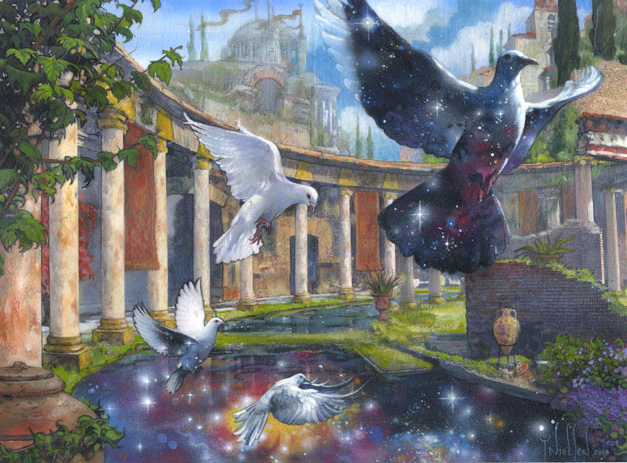
Plea for Guidance | Art by Terese Nielsen
Workmen arrived in spotless white uniforms, erecting scaffolding and harnesses in silence. Up they climbed to the tops of the columns, and Euneas saw bigger and newer azure columns being lowered from the distant sky slowly, carefully, by the workmen above. There was a brief pause, and clang the columns from the sky crashed down into the columns in the plaza. The lions stopped their patrolling, their golden feet still; the fountains stopped their flow and the scholars ceased their conversation. Each of the original columns had sunk a foot into the ground, and a web of cracks appeared in the marble floor. There was another clang and the columns sunk another foot, and the lions resumed their patrol, the water its arc, the scholars their debates.
There were more clangs as the first azure columns were crushed by the new arrivals of their identical replacements. The only remnant of the originals were blackened compressed stumps, surrounded by dark fissures in the marble. New columns were lowered from the sky on top of the replacements, clanging into the second wave of columns with increasing frequency until there was stump upon stump, and Euneas could see a fourth wave of columns being directed with urgency by the workmen above.
The cracks and fissures were spreading, black tendrils of dirt and grime connecting through the once-pristine marble. The scholars and philosophers waved their hands in the air, screaming at each other, but now their equations were made of grimy dust describing banal trivialities, and as soon as they appeared they fell lifeless to the ground, adding to the dirt below. The frothing water in the fountains sputtered, and ceased, replaced by an oily sludge spewing to the pace of an ill-beat heart. A golden lion struck its gleaming foot into the sludge, and the lion slipped and crashed to the ground, its foot shearing off at the impact. The metal lion staggered up, limping along on three feet, its broken limb hemorrhaging an endless gush of blood.
The blood mixed with the dirt and the grime and the oil, as still more columns were lowered from above, and every column delivered to this point packed down to the space of a small unmarked grave. Hundreds of years, thousands, were compressed into those beaten columns, along with the lives and blood and dirt those years had created and churned through. Nowhere was a pristine spot left, all was tainted by the advancement of the city, the continued push to build anew on top of corruption and death.
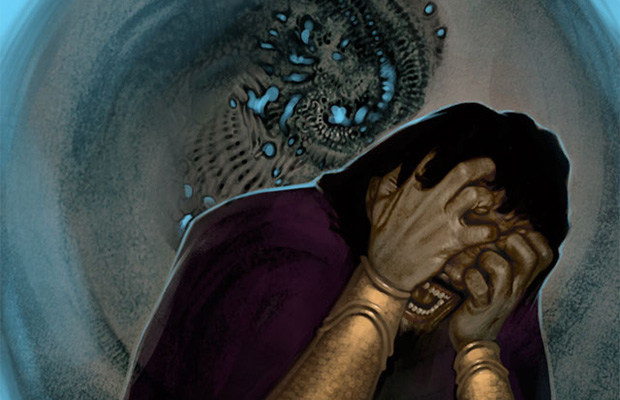
Tormented Thoughts | Art by Allen Williams
Euneas looked up to see the workmen descending in a scrabble, their white uniforms now a dark, oily mess of tatters, their faces desiccated and without skin, their gaping mouths captured in an eternal scream of no sound. When Euneas looked down again he saw the oily darkness surrounding him, threatening to pull him under. He tried to flee, and a lick of oily taint caressed his ankle. The tendrils of darkness crept up his legs, his skin fissured and bubbling with its touch. Euneas screamed a song with no words and scratched and tore to keep himself clean. Skin sloughed away as he scrubbed and scrubbed to remove the oily taint, but even as he tore all the skin off his body, the taint remained, calcifying, locking him in place. His eyes were the last things that were free, searching for escape, and when they looked up they saw new columns descending.
The city had claimed him whole, another piece of sediment for the streets future inhabitants would trod upon in their brief doomed hours.
Euneas woke screaming.
Somewhere in Akros
Pollio dreams.
The streets thronged with people. Pollio had never seen the dusty streets of Akros so full. Soldiers, bakers, old women, gladiators, farmers, little boys, slaves, Pollio's children, priests, his children, his children, where were his children? There, in front of him, the press of the crowd keeping them hemmed in.
Pollio took two long strands of twine, blue twine, and tied one end around his wrist, and the other end of each twine around the wrists of his children. Pollio took a deep, contented breath. His children would be safe, the blue twine keeping them close and protected. He took some more twine, green this time, and tied it the same way he had tied the blue twine. Now his children would be fed. Red twine went around his wife's wrist and his own, the sign of their matrimony.
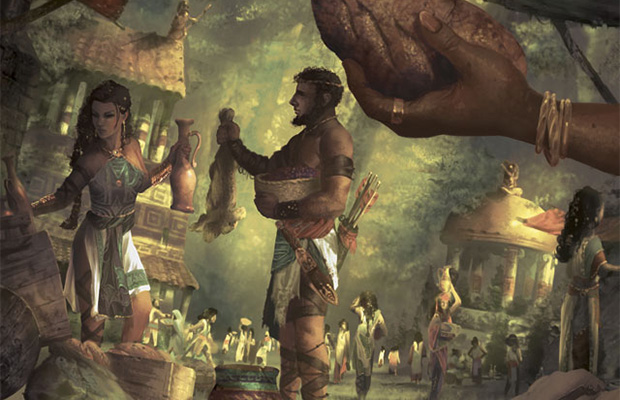
Market Festival | Art by Ryan Barger
As he found his customers in the street, and there were many who valued Pollio's metalcraft, they were connected by yellow twine. Pollio's left wrist was adorned with many tens of bracelets of different hues, each thread a relationship, a connection to the many faces of the city. And on his right wrist were more bracelets, connecting him to several soldiers who protected Akros; Tomakri the baker, who made the sweet cinnamon rolls his wife loved so much; Kopaknios the ingot-deliverer, who supplied the precious metals Pollio transformed into blades and armor; and others, so many others.
Pollio had been able to move with ease with the first connections, but now each new connection was difficult. The twine could stretch, stretch long, but it not could not stretch forever. Everyone went their own way in the city; the hundreds of people Pollio was connected to had hundreds of connection of their own, and as people crossed paths in the city new connections formed all the time. Pollio's movement slowed, and then became labored as he struggled against the brightly colored threads in all directions. He sought to break the twine, but could not, no matter how his formidable muscles groaned and strained. The more he struggled, the stronger and larger the twine became until it was thick, corded rope.
Soon, all movement stopped on the street, each person fighting against the constricting bonds. Pollio could not see his children or wife anymore, as the rope chafed against his head and neck and he could not turn an inch. All he could do to stay standing was fight against the weight of all the people around him. The ropes became tighter and tighter, and everyone was brought closer and closer. Flesh pressed into flesh, and still the ropes grew stronger and tighter.
Someone's cheek pressed up against Pollio's and the rank smell of desperate humanity filled Pollio's nostrils. He could not move, imprisoned as he was by bodies, and the ropes, those connections the city demanded in a world without freedom and space. He felt a scratching where the next man's cheek joined his, and he realized their cheeks were joining, their flesh knitting together as the ropes pulled tighter and tighter. Pollio tried to scream, but his mouth was covered with ropes and other people's flesh, and the only sound that emerged was the absence of hope.
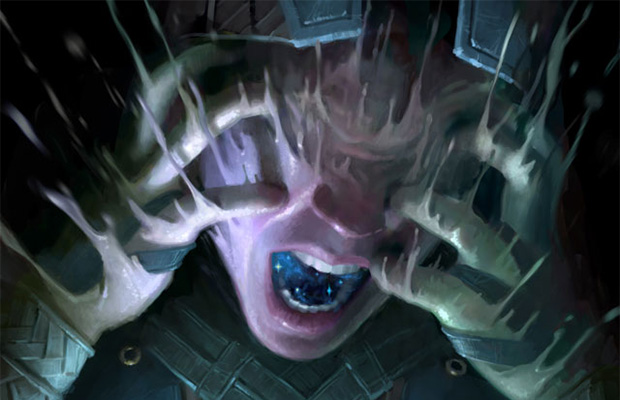
Cast into Darkness | Art by Clint Cearley
Then, Pollio was part of one amorphous mass of stinking flesh and burning rope, a mass beholden to the rotting cesspool they called home. This was the destiny of those who dwelled in the city.
Pollio woke screaming.
Somewhere in Meletis
Melantha dreams.
She sat at the head of the temple dinner table. This is not my place. The cloth was impeccably white, and torchlight flickering and dancing along the white-and-blue-tiled walls illuminated two settings at the long table—hers, and one next to hers at her left.
Steps echoed from down the hall, but in the gloom beyond she could not immediately make out their source. The footsteps approached and there was a face in front of her, a face she had not seen in twenty years. "Melantha! May I join you?"
Xenocrates had been one of her first mentors at Ephara's temple when Melantha had arrived so many years before. To the outside world, the priesthood of Ephara was kind and welcoming. Inside, the truth revealed was darker. Melantha had struggled to find her place, to balance the demands of serving her god with finding acceptance among her peers. Xenocrates had protected her, had championed her, had provided a shoulder to cry on. There had been much crying in those first few years. She looked at his round, clean-shaven face, this face she had not seen for so long, and it did not surprise her she was crying again. If she looked over her shoulder, if her heart beat a bit faster, what of it? She was with her friend again.
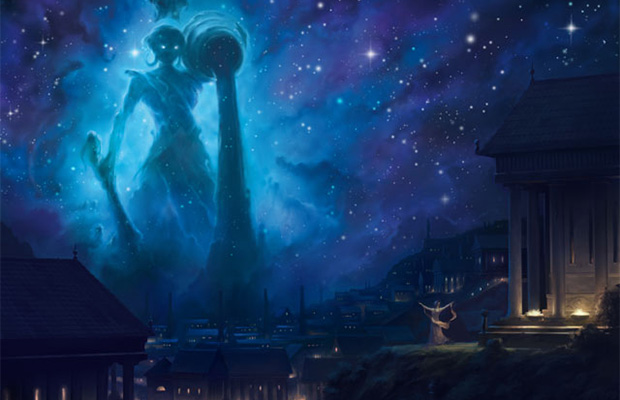
Ephara's Radiance | Art by James Ryman
"Melantha, do not be sad. Let us eat and drink. I am quite hungry." Food and drink appeared in front of them, and Xenocrates tore into the meal with vigor. Don't drink! Melantha was not hungry, and so she studied her friend instead. While his face looked hale, the rest of Xenocrates was gaunt and far removed from the round-bellied, cheerful man she had known so many years before. Xenocrates picked up the goblet in front of him, and Melantha wanted to cry out, to warn him, but she was silent as he put the goblet to his lips and drank deeply.
"Have I told you, Melantha, about my new theory on the gods?" Xenocrates looked up at her and smiled, and there was an unsightly bluish stain on his lips and teeth. From the wine, Melantha thought. Probably.
"I don't think we should talk about that, Xenocrates. It's not... correct. Tell me about you, instead. How are you? How have you been?"
Xenocrates took another deep drain of his wine and Melantha winced. Xenocrates coughed before answering. "It feels good to eat. To really eat. To feel the food in your mouth crumble and change and decay, to hold it all in, the flavor and the chaos, the death of life to give you life. Yes, it feels good to eat. But I was talking about the gods, Melantha. What they are, what they really are."
"We're not allowed to discuss this. It is forbidden."
There was more coughing, longer and sustained, before Xenocrates spoke again. "Forbidden? I hear you are on the high council now. I am proud of you, Melantha, to see how far you have come. You can determine what is forbidden, yes? What is acceptable? We have spent many hours debating the nature of the gods. What is one more hour among friends?" Another fierce cough, and Xenocrates raised his hands to wipe away his mouth. There was a small smear of blood on his lips and cheek.
"You're hurt. Let me..."
"No, I'm fine, Melantha. I'm fine. A little cough won't hurt. Now, I'm not eternal. We both know the truth of that. Only the gods are eternal, we say. Only the gods are constant. And yet it is odd, surely, to read the earliest extant writings on Heliod and Thassa and the rest, to see how differently those versions of our gods acted compared to now.
"Koblios, in Meditations, said, 'The gods are simply patterns personified,' before he was stoned for his heresy. Sad that, despite the price he paid, he was still wrong. Gods are the patterns we recognize, personified. The difference is in the creator. Through the power of Nyx, we are responsible for our gods. Perhaps we are even responsible for Nyx..."
"You will be quiet!" Melantha stood, furious. She would not permit this blasphemy in her temple. Even after all these years, Xenocrates insisted on believing these awful untruths. Xenocrates coughed and coughed and a large clot of bloody substance landed on the white tablecloth, staining it red and pink. When Xenocrates looked up, he smiled a ghastly smile, his teeth stained a dark indigo, and blood leaking from his mouth.
"What will you do, Melantha? Kill me?"
The anger fled Melantha and, with it, her ability to stand. She crumpled to the bench. "I did not... I did not kill you, Xenocrates." I saw them put it in the goblet. I could have warned you. I could have told you.
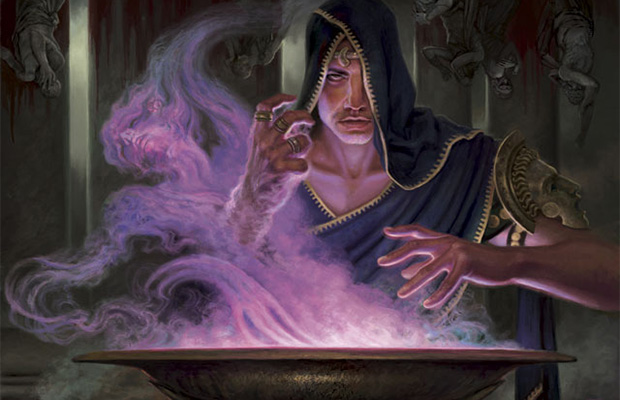
Claim of Erebos | Art by Zack Stella
Blood started to leak out of his eyes. "Perhaps you didn't, Melantha."
You said such horrible things. Such untrue things. What else could they do? What else could I do?
"Did you know, Melantha, there are so many states of decay before you die? So many ways to degrade and be degraded, so many injuries and debilitations to experience before the final dissolution. Eventually, you become so compromised you cannot remember what innocence was. So many ways to decay. And you've known only a few. You have so much more to experience before you die." Xenocrates opened his mouth wide as blood flowed freely out between his teeth, gushing and pouring...
Melantha woke screaming.
Somewhere in Nyx
The city dreams.
The city enjoyed its peaceful rest. Its long white avenues were clean and gleaming, made of strong stone that absorbed the warm sunlight. It had many wonderful buildings full of beautiful columns and intricate, crafted stonework. For a long time, the city knew nothing but resting in the sun, and it was happy.
Eventually, a small and hairy creature entered the city. It walked around on two legs, and it was very tiny, and the city thought the animal amusing. The animal seemed to enjoy playing in the city, and the city was pleased to have the animal explore. Soon, the animal was joined by a second small and hairy animal, and as they ambled throughout the city, the city created small parks and lakes for the animals to play in, and it made small buildings for the animals to sleep in, and provided trees for the animals to pick fruit from, and the city was happy.
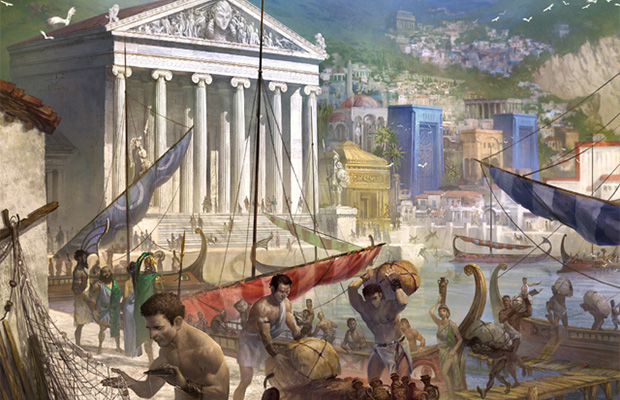
Temple of Enlightenment | Art by Svetlin Velinov
The next day, the city awoke to find many of the small, hairy creatures in its streets and buildings. There were hundreds of them, and the city wanted to make sure they were fed and sheltered and provided for, and never had the city felt so needed and wanted and busy. The city's streets were no longer glistening and clean, but as the city went to sleep that night it thought about all the creatures it had provided for and it was happy.
The next day, the city awoke to an uncomfortable scratching. The creatures were everywhere. There were thousands of them, many thousands of them, and they walked and crawled and climbed in and out and through and over all of the city. Everywhere, the creatures left hair and stains, and the city's once-beautiful streets were clogged with dirt and grime and mud.
The vermin continued to spread, and their little ape-mouths nipped at the city's trees and lapped the city's water, and their ravenous hunger even led them to bite at the city's stone buildings and streets. Every avenue and structure of the city was covered with the hairy pests, biting at the city's body, and the city started to tremble and shake to rid itself of the pestilent horde.
YOU MUST ARISE.
The city did not recognize the voice, nor could it see where it came from.
YOU MUST AWAKEN.
The city realized it had never heard another voice before, but the truth of the words became apparent. The city must arise. The city must awaken. There was another world to grasp.
Cacophony, the god of cities, arose. It looked around at the little apes clinging to its body. It saw their hunger and their fear, and it was happy. Cacophony reached out with its newly formed hands and grabbed thousands of the hairy ape-creatures, crushing them and flinging their corpses to the ground below. It would not destroy all of the apes, just some, just enough for the survivors to live their little ape lives in agony and fear, and then it would...
"What monstrosity is this?" It was the second voice the newly awakened god heard that day, although unlike the first, this voice was one Cacophony had heard before—although it could not remember from where. A tall, dark-skinned woman strode into the city god's view, her skin covered with the stars of Nyx, and underneath that skin, for those with the senses to see, pulses of blue and white energy blared like the sun.
The woman's eyes, star-filled orbs, dimmed and turned red as she looked at Cacophony. "You dare exist? And who dares to create you? Where are you, mortal? I will find you. You cannot hope to hide from such as I."
As she spoke, the woman extended her hands, plunging them into Cacophony. "I am Ephara, and you should no more exist than a finger separated from its hand. Goodbye, Little One." Her voice sounded almost kind, at the end.
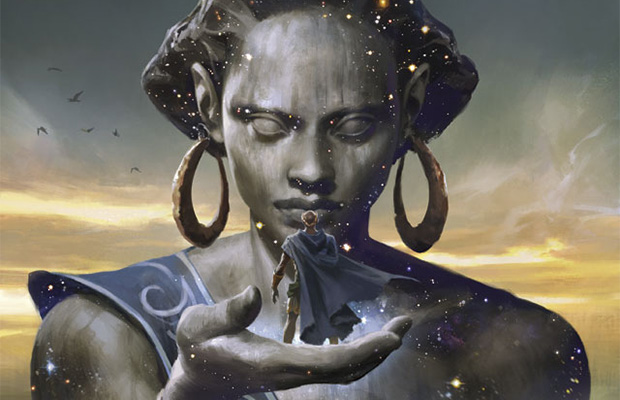
Ephara's Enlightenment | Art by Wesley Burt
Cacophony did not know what was happening, could not understand why its life was draining, its awareness slumbering. As it fell back into non-existence, the city-dream once known as Cacophony never had a moment with enough coherence to know regret.
Cacophony, the god of cities dark, never woke again.
Somewhere in Theros
The earth's rumbles faded to stillness as the last remnant of Phenax's glamour dissolved around Ashiok. Ashiok hovered in midair, silent and still, before extending senses out into the surrounding area to make sure Ashiok was alone and no vengeful god was in pursuit.
Ashiok had specifically chosen the abandoned temple to Ephara in a deserted city on the outskirts of civilized Theros. Numerous small deserted cities could be found like that one, a testament to the futility of permanence in a world controlled by the whims of gods.
One of those whims had allowed Ashiok to be unseen and undetected by any force on Theros, save one.
"So what boon do you wish of me?" the god Phenax had asked Ashiok, not so long before, to repay a favor the Planeswalker had done for the god. That Ashiok had enjoyed performing the favor immensely had no bearing on the need for repayment. Gods do not suffer being in debt to mortals for long.
I wish to hide from the gods.
Ashiok relied on Phenax being amused by the thought of deceiving all the other gods, and Phenax had proved Ashiok right. The boon was a temporary one, and Phenax had been very explicit about Ashiok's fate if Ashiok used the boon to attempt to injure or murder a god.
But Phenax had never said anything about attempting to create a new god.
The attempt was never going to be successful. But it was beautiful. Beauty mattered a great deal—not Ashiok's most important value, but still something to cherish. Besides, success in this field seemed problematic anyway. Xenagos's apparent fascination with being a deity mystified Ashiok—one of the few things opaque to Ashiok. Xenagos was a Planeswalker. What better opportunity for creation and beauty was there?
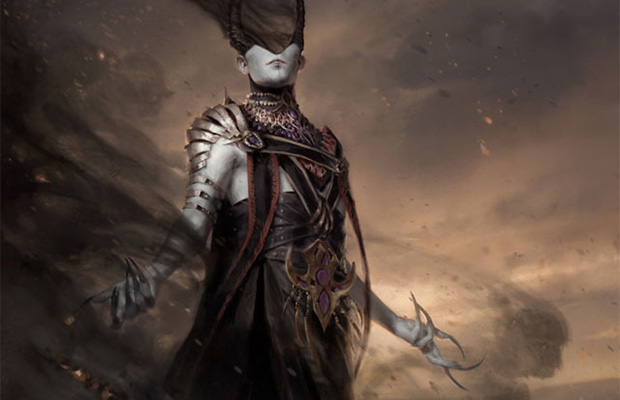
Ashiok, Nightmare Weaver | Art by Karla Ortiz
Xenagos had proven turning a mortal into a god was difficult, but possible. But turning an idea into a god was much easier. And for those who had the ability to control dreams, it was simpler still. Ashiok suspected ideas took shape and became proto-deities in Nyx all the time, but were probably subsumed into the existing deities without anyone, including the gods, aware it was happening. But if that process was shaped, was sculpted, if the humans' connection to their gods was attacked, if their connection to their patterns was attacked, while a new path for that pattern was prepared... well, Cacophony could rise again.
How the artist would escape detection from the gods while allowing the created god enough time to survive and grow strong would be difficult. But those were details for some technician in the future to execute. As for the consequences of that day... let Ephara wonder what machinations had led to the display. Let other gods inquire and worry and investigate what it presaged.
Mortals were not the only creatures prone to seeing patterns where none existed.
Ashiok had already moved on to contemplating the next symphony. There were always more wonderful displays to create, here in the fertile world of Theros.
Tiny bits of Ashiok's cheek dissolved into smoke. New dreams were born.

